International Issues
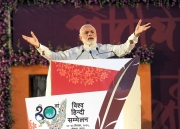
India's experience in cultural diplomacy communication
MA. TRAN BAO CHAU
Diplomatic Academy of Vietnam
(PTOJ) - India's achievements in comprehensive political, economic, and social development in recent years reflect the State's correct development path and the joint efforts made by the Indian people. The use of media in cultural diplomacy plays an important role in India's achievements. This article studies and outlines India's experiences in cultural diplomacy communication.
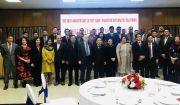
Achievements and prospects in Vietnam - Pakistan relations
MA DUONG THANH HANG
Institute of International Relations,
Ho Chi Minh National Academy of Politics
(PTOJ) - With a consistent foreign policy, Vietnam always attaches importance to and develops relations with countries around the world, including Pakistan. The article outlines the development process of the diplomatic relations between the two countries in the period 2002-2022 and the prospects for relations between the two countries in the new period.
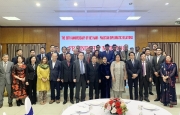
Achievements and prospects in Vietnam - Pakistan relations
MA DUONG THANH HANG
Institute of International Relations,
Ho Chi Minh National Academy of Politics
(PTOJ) - With a consistent foreign policy, Vietnam always attaches importance to and develops relations with countries around the world, including Pakistan. The article outlines the development process of the diplomatic relations between the two countries in the period 2002-2022 and the prospects for relations between the two countries in the new period.
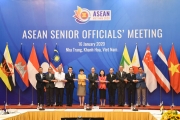
Some solutions to improve Vietnam's role in asean-led multilateral mechanisms
Assoc. Prof., Dr. NGUYEN THI THUY HA
Academy of Politics Region I
MA. LUU THI MAI ANH
Political Theory Journal,
Ho Chi Minh National Academy of Politics
(PTOJ) - Entering the third decade of the 21st century, ASEAN is effectively promoting its leading role in multilateral mechanisms in the Asia-Pacific region. ASEAN's central role in regional architecture is increasingly supported and enhanced. This article clarifies the coordinating role of ASEAN in multilateral security, political and economic mechanisms, thereby proposing a number of solutions to promote the role of Vietnam - as a member of ASEAN - in the multilateral mechanisms led by ASEAN, allowing Vietnam to truly become the nucleus of cohesion, strength, and prosperity.
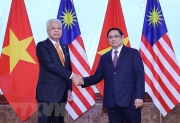
Looking back on the Vietnam - Malaysia strategic partnership from the perspective of nation-people interests
MA. PHAM THANH BANG
PhD Student of Diplomatic Academy
(PTOJ) - After having been upgraded to a Strategic Partnership (in 2015), cooperation between Vietnam and Malaysia has been promoted in many fields, especially politics - diplomacy, defense - security and trade - investment. Overcoming difficult times due to the strong outbreak of the Covid-19 pandemic, the Vietnam - Malaysia Strategic Partnership is gradually moving to a new stage with more sustainable development. Although there are still differences in some specific issues, the trends of cooperation are still maintained. This article analyzes and clarifies the results achieved and the prospects of the Vietnam - Malaysia Strategic Partnership from the perspective of national and people's interests.
Education of Marxism - Leninism, Kaysone Phomvihan Thought for young people in the central provinces of Laos
SOUVANXAY DENGGOUANGTHONG
School of Politics and Administration of Kham Muon Province
(PTOJ) - The education of Marxism - Leninism and Kaysone Phomvihan Thought for Lao Youth in general, and young people in the central provinces of Laos in particular, is an urgent issue in order to enhance the young people, giving them a firm political stance and ideology, creating firm belief in the leadership of the Lao People's Revolutionary Party and the path to socialism, fighting against wrong and hostile views in the new situation. The article points out the achievements, limitations, causes of the limitations and proposes some solutions in the education of Marxism - Leninism and Kaysone Phomvihan Thought for young people in Central Laos.
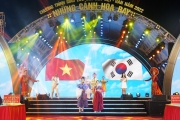
Vietnam in South Korea’s new Southern policy
(PTOJ) - Vietnam and South Korea are preparing to celebrate 30 years of diplomatic relations, more than ten of which have been as strategic partners; the two countries are looking forward to a comprehensive strategic partnership in the near future. This article aims to clarify the content of South Korea's New Southern Policy (NSP) and highlight the important position and role of Vietnam within this policy.
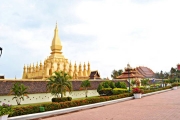
Criteria for assessing the quality of district cadre contingents under SCPPC in Central Laos
(PTOJ) - Determining the right system of assessment criteria is the first condition for properly assessing the quality of cadre contingents. For district cadre contingents under the Standing Committee of Provincial Party Committees (SCPPC) in the central region of the Lao People's Democratic Republic, it is necessary to pay full attention to the following criteria: number and structure; political qualities; moral qualities, lifestyle, sense of organization and discipline; qualification, competence and work style; willingness to undertake and fulfill assigned responsibilities and tasks.
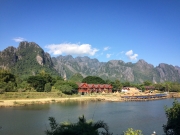
Improving the practical organizational capacity of district-level leadership and management officials in Bokeo province, Laos
(PTOJ) - This article presents the concept of the practical organizational capacity of district-level leadership and management officials in Laos. Thereby, this article clarifies the requirements and actual situation in the field, as well as proposes some solutions to improve the practical organizational capacity of the district-level leadership and management officials of Bokeo province, Laos in the coming period.

Energy transition towards a green living model in germany and experience for vietnam
(PTOJ) - Germany - the world's fourth largest industrial economy, has had a successful energy transition towards a green living model. The country has a 100% energy consumption target from renewable sources by 2035. Germany is also a pioneeringcountry and has many contributions to the process of making European and global policiesaboutclimate protection. In addition, Germany's successes in energy transition and equitable transition are also valuable experiences for developing countries to make commitments to environmental protection and sustainable development.
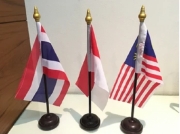
The current political party systems in Indonesia, Malaysia and Thailand
(PTOJ) - In contemporary political life, political parties play a vital role and dominate the democratic process of each country. The article analyzes and compares the characteristics of the political party systems in Indonesia, Malaysia, and Thailand.
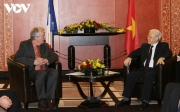
Traditional special relationship between the French Communist Party and the Communist Party of Vietnam
(PTOJ) - The French Communist Party and the Communist Party of Vietnam have a special close relationship, President Ho Chi Minh - leader of the Communist Party of Vietnam is one of the founders of the French Communist Party. That the friendship between the two parties has been deeply strengthened is a testament to the international spirit of the communists struggle for the common cause. December of 2020 marks the 100th anniversary of the establishment of the French Communist Party, a good time to look back on the relationship between the two parties, to celebrate the friendship and solidarity between the French and Vietnamese revolutionaries.
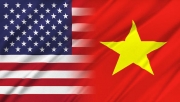
Vietnam’s views and policies in relationship with the United Nations
(LLCT) - Right after gaining national independence (1945), President Ho Chi Minh and the Party intended to have Vietnam join the United Nations. However, more than 30 years later, in 1977, Vietnam officially became a member of the United Nations. Since then, we have proactively, actively, and responsibly participated in the United Nations, making important contributions to solving global issues, thereby, enhancing the national standing, maintaining independence, sovereignty, and firmly defending the Socialist Republic of Vietnam, creating a peaceful and stable environment for the cause of construction and development of the country. This article focuses on analyzing and clarifying Vietnam’s views and policies, achievements and prospects of the relations with the United Nations.
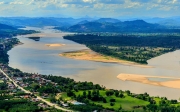
Cooperation activities for water resources development in Mekong River basin of International Mekong River Commission: Realities and challenges to Vietnam
(LLCT) - Flowing through China, Myanmar, Thailand, Laos, Cambodia and Vietnam, the Mekong River plays a particularly important role in socio-economic development of these six countries in the basin. However, these countries have different interests in the exploitation and use of water resources of the Mekong River. The exploitation of water resources of upstream countries has had a great influence on the development of downstream countries, especially Vietnam. In 1995, the International Mekong River Commission was officially established with the main role of promoting, coordinating the management and development of water resources in a sustainable manner for the common good of all nations. However, this role has not been fully and effectively implemented. Therefore, Vietnam needs to promote cooperation to bring into full play the Commission's active role in the use, management and protection of water resources.
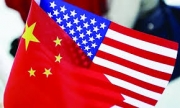
Conflicts and agreements between the U.S. and China: from theory to practice and forecasts
(LLCT) - With China’s growth and the relative weakening of the United States, there is growing speculation that China and the United States will soon fall into the “Thucydides’s trap”, meaning that there will be a major war in the process of a power transition. Meanwhile, there are also opinions that the current U.S. and China relation have many complex variables; it is not easy to get into conflict. For Vietnam, developments in the U.S. - China relationship has always been an important factor in assessing the external environment. This article provides reviews and predictions about the potential for conflict and agreement between the United States and China, both theoretically and practically.
Journal Archives
Journal Archives
Media
Photo Gallery
Contact us

 International Issues
International Issues


